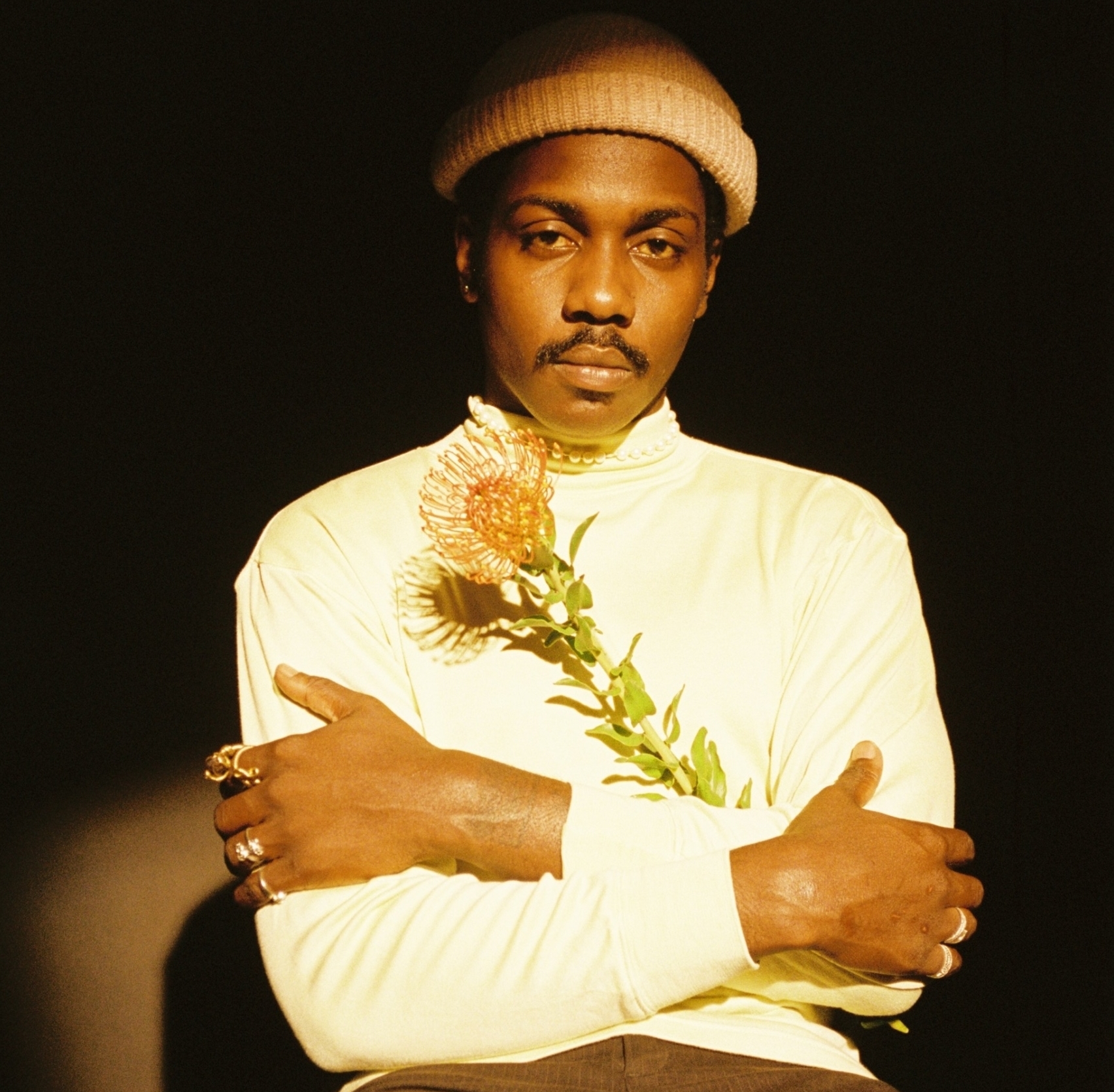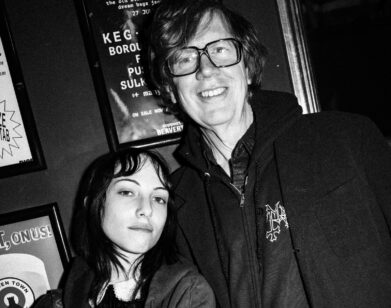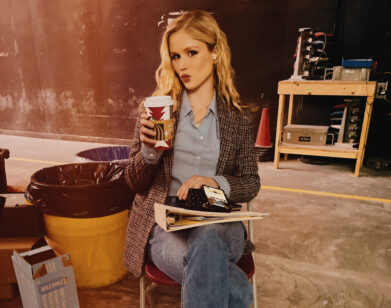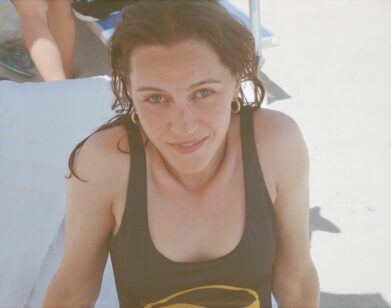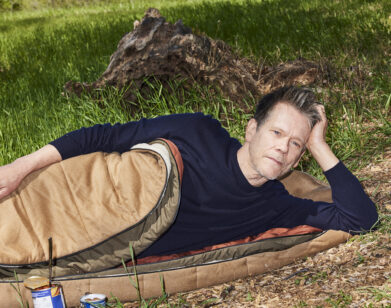SG Lewis, Robyn, and Channel Tres on Making Club Music When There Is No Club
Dance music will save the world—or at least it can help alleviate the pain we feel while living in it. For the London born-and-raised singer, songwriter, and producer Sam George “SG” Lewis, that’s the motto behind his not yet announced—but very finished upcoming album. The 26 year old has carved out a cult following thanks to his soulful and masterful approach to creating dance music. His latest single, “Impact,” features the Robyn and Channel Tres, a Los Angeles songwriter and producer who opened for the Swedish singer during her Honey tour. The track is a monster of a dance record with a dark and exhilarating beat adorned by Tres’s raspy talk-like invitation to “get down” on the floor, topped off with Robyn‘s vocals.
Though Lewis’s natural habitat—the dancefloor—is no more (for the time being), there’s something to be said about the resilience of dance music and the people who keep making it, regardless of the existence of nightlife. Lewis, Robyn, and Tres are those people. A week before the single dropped, Lewis hopped on a Zoom call with his collaborators and friends Robyn and Tres to discuss the painstaking process of sharing music with other musicians like Diplo and Max Martin, one of “the greatest nights ever,” and why making dance music nourishes the soul.
———
SG LEWIS: Hey, Ernest. How are you doing?
ERNESTO MACIAS: Hi Sam, I’m doing great. How about you?
LEWIS: I’m great. I pretty much just finished the album. I feel weird. I don’t really know what to do with myself.
MACIAS: I guess you should feel excited. Relieved?
LEWIS: It’s a weird combination of relief, but then also not really knowing what to do with myself because this has been every day for nearly 18 months now. It’s just strange because you spend so much time with all the music and you know that everything on the album’s been my favorite thing at some point. That’s the thing that I’m holding onto now. I feel super proud of it and I’m just excited to share a lot of it, really. Where are you right now?
MACIAS: I’m in Brooklyn.
LEWIS: Oh, I love Brooklyn.
MACIAS: It’s a little weird right now, but it’s still Brooklyn.
LEWIS: Yo, Channel!
CHANNEL TRES: Channel Tres in the building. How are you doing, brother?
LEWIS: I’m good, man. How are you feeling?
TRES: I feel great. Just making music in quarantine.
LEWIS: How’s the project coming along?
TRES: It’s coming good, bro. I just did my mixer notes and all that stuff. I replaced a song just now. So it’s going well.
LEWIS: You feel like you’re getting quite close?
TRES: It’s definitely close. I had to take a break for a couple of days so my ears could rest. But it’s fun, man.
LEWIS: I can’t wait to hear it, man. Sometimes you have to get away from it for a bit, I guess. Bro, how was that back-to-back with Diplo?
TRES: It was great, man. He’s a cool dude. It was definitely a great moment for me. Diplo’s a legend, so just being in great company always feels good.
LEWIS: As it should be. It’s amazing to see those people really sitting up and taking notice of you now. Everyone’s joining the party.
TRES: You see me start up with CDJs and I got better and I can hang with someone like Diplo. I just learned how to use the loop button, so I’m good.
LEWIS: That’s my get out of jail free card
TRES: How are you feeling about your project?
LEWIS: Good, man. I’m just relieved. I was sat in front of it, and then I finally had that moment where I was like, “Shit, it’s done.” It feels like it’s an album and I’m super proud of it. It’s got my favorite music I’ve ever made on it. I’ve never done a full project. On an album, there’s a real commitment to a vision and I’m super proud. I’ve made the album I wanted to make. Now it’s just hoping that people are into it. I’m proud of it enough to be like I don’t really care particularly how it’s received.
TRES: It’s out there and it’s done. You put 100% into it and you feel good. Well, congratulations man.
ROBYN: Hi.
LEWIS: How are you doing, Robyn? I was just chatting with Channel and just discussing I finished the project today basically.
ROBYN: How does it feel?
LEWIS: It feels really good but it’s a very surreal feeling because I’ve never finished an album before. I didn’t think I’d ever have this moment. It’s kind of been my purpose for the last nearly 18 months so it’s a slightly strange feeling. I don’t really know what I’m going to do next week now.
TRES: Make another album. Start the next one.
LEWIS: In an ideal world, I’d have loved to traveled somewhere. Go off the grid for a month.
ROBYN: You’re just going to have a nice walk down to the, I don’t know, grocery store.
LEWIS: I’m going to get a pint in the pub. I had some friends of mine, Guy and Howard, the Disclosure guys, who, after they did their second album, they were like, “We’re going to take a massive break. We’re going to be gone for like six months.” Then they took a month off and then they just got bored. Music’s the thing that we do. As much as it’s hard work, it’s the thing that you want to be doing.
ROBYN: You should savor the moment. Even though it sucks the way things are, you should just try. I’ve been in the studio for all of July and a lot of people here are in their country house or not in the city. I mean the people who can. I love working now when nobody else is working. It’s like being up late or being up early. I feel like I’m doing things when other people aren’t. It’s not that it just feels good because you’re using the time well, it’s also because I think there’s less pressure.
LEWIS: It’s strange because I don’t feel like I’ve had the same experience of COVID and lockdown as most of the world because I’ve been so consumed by this project.
TRES: A part of me is feeling kind of guilty and selfish because I just don’t care about anything. I just care about my sound. Kind of like what Robyn’s saying. I’m up at three in the morning doing stuff. But it’s also been keeping me out of trouble.
LEWIS: I kind of understand that feeling, too. Especially with everything that had gone on. Especially making a dance record. A lot of dance music is kind of escapist in its nature and it felt like there was so much important stuff going on in the world that at times, it’d feel like a selfish thing to do just to be focused on this album. On the flip side, I guess there’s an argument that escapism serves the purpose in the wider context of when these things are going on. People use music as something to help them alleviate some of that. Or sometimes when things are hard, they use it to escape those feelings.
TRES: People want projects. They have time to listen to stuff. Your fans probably want that.
ROBYN: I agree with you. I guess it helps to think about where you do the most, it’s where you’re most useful.
TRES: I know I’m definitely not a politician and I’m definitely not anything else, but I know I can DJ and make tracks and that’s my passion. That’s my best service to give to the universe, because that’s the gift you’ve been given. I just have to use it.
ROBYN: For me, it’s trying to get closer to the things that I think mean something to me. Or things that I think I can do well. But also just listen to other people that are already doing stuff that matters, instead of trying to recreate the wheel. There are so many good people that are already organized and you can support them.
TRES: I feel the same way. I’ve been listening to old stuff, like Marvin Gaye and Prince. Just allow myself to study, to understand the importance of the different artists. Just being real. Paying attention to background vocals and why this chord goes this way. Just nerdy things. Stuff that I just wouldn’t normally do because I was always on the move. Now I’m like a nerd, I feel like my room is like Dexter’s Laboratory now, man. I’m just in my head.
ROBYN: That’s the best feeling, though.
TRES: Working on music has been really therapeutic for me.
LEWIS: Robyn, we were talking about that feeling of completing a project and that feeling of purpose it gives you in the process. You’ve obviously put out a few albums. Does that feeling change at all as you make more albums?
- Photo by Clare Gillen.
- Photo by Mark Peckmezian.
ROBYN: I think it’s different every time because they’re different records and you’ve gone through different things to make them. Some are really difficult to make. If a record is stressful, sometimes when you finish it, you can feel a bit sad. It’s not always fun to make records. It’s super stressful. Like you’re saying, it can feel empty. But I think it’s passing. Also, now it’s a very special situation because you’re not going to be able to tour with this record, probably. Usually, you’re so busy when you release an album. I don’t really know how I feel around that time a lot of the time. I’m just so stressed doing other things. So maybe this is actually a nice time.
LEWIS: It is super unique in that sense. Handing in an album and then I’m kind of just free to do whatever I want for the next however long until I decide to start making a record again. I feel if you got me to sit down and make something right now, it would probably suck.
TRES: I don’t think anything sucks. Just really cherish the good days because of it’s ups and downs. Some days go good, some days go really bad. When I’m having those bad ones, I just try to disconnect from music and do something else.
ROBYN: Sam, don’t you have lots of ideas now that you finished a record, that you didn’t finish for this record? I usually have little scraps and stuff when I’m done.
LEWIS: I definitely do but there are so many things that will just disappear into the ether, into the hard drive. I went through an old computer the other day and found all these half songs and some of these are great but I just know that I’m never going to finish them. Which is kind of sad. I think that what’s different about this as well is that I would gain so much inspiration from living life and traveling. The lives that we get to live and the places we get to see, that’s a constant source of inspiration. It’s not to say this situation is any less inspiring, but it’s a very different source of inspiration, I guess. I’m interested to see what kind of music I want to make now. I think on paper because I’m spending so much time at home, I’m less interested in club music. But weirdly, I feel more into club music than ever right now even though I haven’t been in a club for six months. I think there’s no way of predicting it at all but I’m just interested to see what comes next.
TRES: I had a project all ready to go but it was all just really house and club. When quarantine hit, I just started making this different type of music. It’s not necessarily dance music but some of it is. But it’s a mixture of my West Coast roots mixed with dance music. I’m transitioning into not caring about the structure of it and just letting it be my brain. Letting people into my consciousness a little bit, instead of trying to make a formulated record or something.
ROBYN: That’s cool. I would buy that.
TRES: Do you guys have people around you that you play shit for? That if they approve of it, you know it’s good?
LEWIS: I have two brothers who I’m very close with. We’re almost like triplets. They are my soundboard for everything really. Outside of that, not really. But who is it for you, Robyn?
ROBYN: I play music for my sister. But I don’t know, you have to choose carefully who to play for and when. Some people don’t know how to listen to demos. I like to play to people that make music because I think people that make music themselves know what to listen for. So I play for a lot of people that I write with. I played a song for Max Martin two days ago, that was very scary.
LEWIS: Oh my god, really?
TRES: How was that?
ROBYN: He liked it. Phew. I mean he said he liked it. I don’t know. But I felt like he liked it. I hope he did.
TRES: That’s tight.
LEWIS: I would be super nervous in that situation, definitely. It’s also when you look up to people, that definitely makes it a more intimidating process. When you have a certain level of respect or admiration for someone and you’re playing a demo and you can almost hear the gaps in the music and you just shrink into a ball.
TRES: I was really flustered at the beginning of quarantine because I was just sending out demos to everybody and I wasn’t getting no response back. I was just like, “No one likes me.”
ROBYN: It’s nerve-wracking to play stuff for people, I think. Some people need to listen to songs so many times before they feel like they can let go. Some people don’t even like to drive out to music they haven’t heard before.
LEWIS: That’s the best feeling. I still remember some of my favorite songs, that moment when you first hear that magical thing and there are very few feelings like that in the world for me. When you hear something that’s just incredible for the first time and you’ll never really get that again. I remember when Frank Ocean dropped Blond and everyone had been waiting for this album forever. I was sat in the back of a sprinter van, we were touring across Europe and I was lying on the bunk at the back and I just had my headphones in. I remember playing “Self Control” and it has that very ascending, euphoric ending with the stacked vocals. I remember lying there and I think a single tear rolled down my face.
TRES: It’s so funny that you bring up that album. When I’m done making music and I’m up late, that album is literally been putting me to bed. It is so good. The mix is so perfect because it’s not really low-end heavy, not top-end heavy, it sounds like a stream of consciousness album. He has so many open-ended bars that you can put meaning to for yourself.
ROBYN: It’s true. I listened to that album yesterday.
TRES: That’s crazy.
ROBYN: That’s funny. It’s a melancholic album, which is not very common in American music.
TRES: It’s funny how few albums end up being that. There’s such a wealth of music now but there are probably five or six albums that I constantly rotate.
ROBYN: Which are they?
LEWIS: I’d say probably, Voodoo D’Angelo. I love one of Common’s first EPs, Resurrection. I always end up back there.
TRES: I love the old guy on the interludes at the end.
LEWIS: The first James Blake album as well. I know James is a good friend of yours, Channel, but there was a point in my life where he was everything to me. I worshiped that guy, I still do. I think he’s absolutely incredible. He’s one of those people that even if I knew him on any personal level, I don’t think I could ever not be just a fan of his.
TRES: That’s how I feel about Tyler, The Creator. I think he’s a very inspiring artist. I met him a couple of times and nothing will change because of the music. I like the way he put his music out and how every album, you could see his progression getting better and him getting into himself and his art.
MACIAS: Let’s talk about “Impact,” the song that you all three worked on together.
ROBYN: What do you want to know?
MACIAS: You were talking about bangers and playing music for each other, for people that you admire or have worked with. So I wonder how that was for all three of you?
LEWIS: I’ll tell it from my angle and then you guys can say if you saw it differently. Me and Channel have been friends for a couple of years now. We’ve known each other for some time, and we hang out all the time in L.A. Robyn invited Channel to open for her, and we were all so excited for Channel to be opening for Robyn. We are all such fans of Robyn and her music. They were on tour together and then from what I gathered, really formed a connection and appreciation for each other’s music. So when Channel was put in the L.A. show at the Palladium, it was a big moment for him. We also ended up at the after-party at Rondo in LA.
TRES: One of the greatest nights ever.
ROBYN: It was great.
LEWIS: Fast forward, me and Channel in the studio maybe a couple of weeks later. I had the instrumental and Channel basically recorded the first verse of “Impact.” I actually have this photo of when we recorded it but we were drinking at the same time. We were just dancing around the room and vibing out. We got over excited from this record. So instead of finishing the record and writing a chorus, we were just like, “Let’s go out.” So we went out. We both agreed that if we could send it to anyone in the world and have anyone write a chorus for this record, it would be Robyn. I think that it was such a dream scenario.
ROBYN: I was sent the track and I was kind of blown away by the beat and by Channel on this beat, the two things together. For me, it was a long time since I heard a beat that made me want to dance that way. Especially because I made you keep the ending without anything on it. I think it’s special when you have a beat like that, that’s so groovy. It doesn’t happen that often, actually.
LEWIS: I’m so glad that you did make us do that ending too because when I listen to it now, I’m just like, how did I ever shorten this at all? Because just when it’s riding out, it’s perfect.
TRES: I think it was a great way for me to capture because when I went on tour with you, Robyn, that was one of my first tours. To be playing Madison Square Garden and all those big rooms, it really gave me the validation I needed to know that I was supposed to be doing what I’m doing. I felt your impact, so it’s just speaking about that tour and what it meant to me. You getting on it and then having Sam make the beat, it was all synergy for me. Now I have something that will remind me of that feeling and it captures it for me.
LEWIS: That’s really beautiful.
ROBYN: Now I’m going to talk about the tour, but what was so cool about having you on the tour was how solid it felt. It just felt so solid every time you went on stage at those shows.
LEWIS: I feel like you came off that tour like a different artist. You’ve always been incredible but you’re right, you came back and the fear had just disappeared. You could feel your confidence in yourself and your craft.
ROBYN: I wonder when we’re going to be able to perform this song together?


